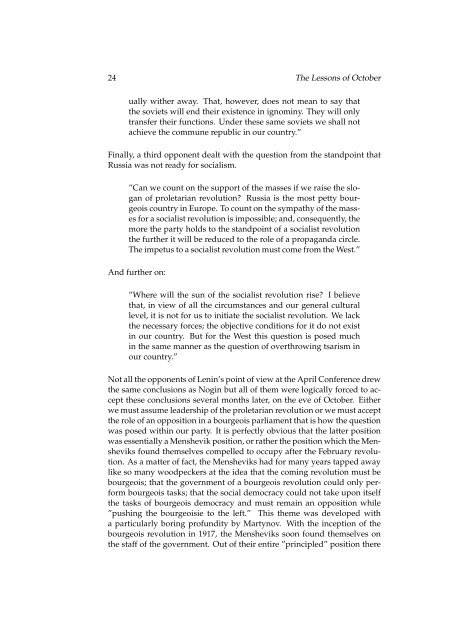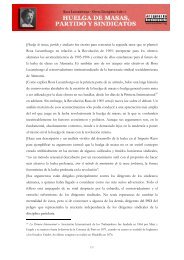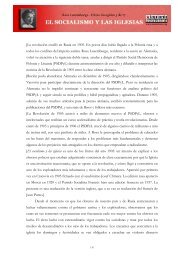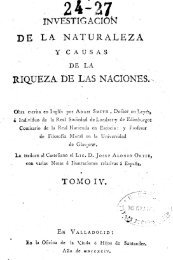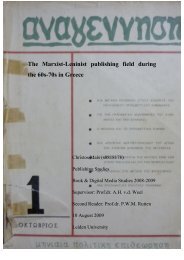Leon Trotsky, The Lessons of October - Platypus
Leon Trotsky, The Lessons of October - Platypus
Leon Trotsky, The Lessons of October - Platypus
You also want an ePaper? Increase the reach of your titles
YUMPU automatically turns print PDFs into web optimized ePapers that Google loves.
24 <strong>The</strong> <strong>Lessons</strong> <strong>of</strong> <strong>October</strong>ually wither away. That, however, does not mean to say thatthe soviets will end their existence in ignominy. <strong>The</strong>y will onlytransfer their functions. Under these same soviets we shall notachieve the commune republic in our country.”Finally, a third opponent dealt with the question from the standpoint thatRussia was not ready for socialism.”Can we count on the support <strong>of</strong> the masses if we raise the slogan<strong>of</strong> proletarian revolution? Russia is the most petty bourgeoiscountry in Europe. To count on the sympathy <strong>of</strong> the massesfor a socialist revolution is impossible; and, consequently, themore the party holds to the standpoint <strong>of</strong> a socialist revolutionthe further it will be reduced to the role <strong>of</strong> a propaganda circle.<strong>The</strong> impetus to a socialist revolution must come from the West.”And further on:”Where will the sun <strong>of</strong> the socialist revolution rise? I believethat, in view <strong>of</strong> all the circumstances and our general culturallevel, it is not for us to initiate the socialist revolution. We lackthe necessary forces; the objective conditions for it do not existin our country. But for the West this question is posed muchin the same manner as the question <strong>of</strong> overthrowing tsarism inour country.”Not all the opponents <strong>of</strong> Lenin’s point <strong>of</strong> view at the April Conference drewthe same conclusions as Nogin but all <strong>of</strong> them were logically forced to acceptthese conclusions several months later, on the eve <strong>of</strong> <strong>October</strong>. Eitherwe must assume leadership <strong>of</strong> the proletarian revolution or we must acceptthe role <strong>of</strong> an opposition in a bourgeois parliament that is how the questionwas posed within our party. It is perfectly obvious that the latter positionwas essentially a Menshevik position, or rather the position which the Mensheviksfound themselves compelled to occupy after the February revolution.As a matter <strong>of</strong> fact, the Mensheviks had for many years tapped awaylike so many woodpeckers at the idea that the coming revolution must bebourgeois; that the government <strong>of</strong> a bourgeois revolution could only performbourgeois tasks; that the social democracy could not take upon itselfthe tasks <strong>of</strong> bourgeois democracy and must remain an opposition while”pushing the bourgeoisie to the left.” This theme was developed witha particularly boring pr<strong>of</strong>undity by Martynov. With the inception <strong>of</strong> thebourgeois revolution in 1917, the Mensheviks soon found themselves onthe staff <strong>of</strong> the government. Out <strong>of</strong> their entire ”principled” position there


